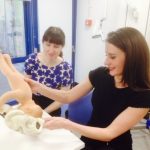Developing Student Midwives’ Practice Performance: The SKIPP Initiative
Institute of Health and Society
Teaching Team Award
Lead Award Author:
Julie Smith, Senior Lecturer in Midwifery
Team:
Tina Dennis, Senior Lecturer in Midwifery
Becci Godwin, Senior Lecturer in Midwifery
Lucy Hope, Senior Lecturer in Midwifery
Toni Martin, Lead Midwife for Education: Programme Leader
Lynne Mason, Senior Lecturer in Midwifery
Lisa Stephens, Senior Lecturer in Midwifery
Kate Taylor, Senior Lecturer in Midwifery
Ros Weston, Senior Lecturer in Midwifery
Contributor:
Ellie Sonmezer, Midwifery Lecturer Practitioner
The focus of this case study is to demonstrate how the Skills for Improving Practice Performance (SKIPP) initiative provides an example of the midwifery teaching team’s collaborative approach to student midwife education.
SKIPP was an innovation introduced in February 2017 to complement the existing clinical skills acquisition element of the programme. SKIPP was the idea of one midwifery teacher but successful implementation required the commitment of the whole team (UKPSF A1 and A4).
The SKIPP initiative is an example of excellent and inspiring practice because it adds value to the student experience by providing a safe environment to develop and hone a range of clinical skills (using high fidelity simulation equipment and mannequins), supporting the development of clinically competent and confident students and future registered midwives (NMC 2009; NMC 2015). Lendahls and Oscarrson (2017) found that students value the opportunity for repetitive practice of skills, enabling them to make the links between theory and practice, increasing confidence and preparing them for clinical practice. Providing students with the opportunity to identify and practice those skills in which they feel less confident respects them as individual learners. By enabling students to attend as often as they wish, the initiative also supports those with different learning needs who perhaps require additional time or repetition to assimilate a skill.
The sessions were held fortnightly at lunch times and conducted in the Clinical Skills and Simulation Centre. They were accessible to all students across the programme, the premise being that students from different year groups support each other, resulting in peer teaching and learning. Drop-in sessions enabled students to be flexible and to fit in attendance around other commitments, maintaining their study/family life balance. One or two midwifery lecturers were present at each session to provide support and feedback.
SKIPP guides for the students were developed by all members of the midwifery teaching team, requiring the team to update their own knowledge of clinical guidelines and the evidence base for practice. Facilitating the sessions also afforded members of the teaching team an opportunity to maintain and develop their individual midwifery skills.
The team believes that this innovation is an example of inspiring practice since it is clearly well received by students. Feedback has been extremely positive:
“So useful for becoming more familiar with equipment, theory and practice, which really helped with progression on placement.”
“I think SKIPP is absolutely fabulous for lots of reasons including making emergency situations much less frightening in practice.”
Further evidence of success can be found in the students’ module evaluations, requesting more sessions, and were identified as an excellent initiative by students in their feedback for the 2017 periodic review of the BSc Midwifery programme.
The midwifery team intends to extend this initiative to develop multi-professional SKIPP sessions in the future.
References
Lendahls, L. and Oscarsson, M. (2017) Midwifery students’ experiences of simulation and skills training. Nurse Education Today. 50, pp. 12–16.
Nursing and Midwifery Council (2009) Standards for pre-registration midwifery education. London, NMC.
Nursing and Midwifery Council (2015) The Code. Professional standards of practice and behaviour for nurses and midwives. London, NMC.


